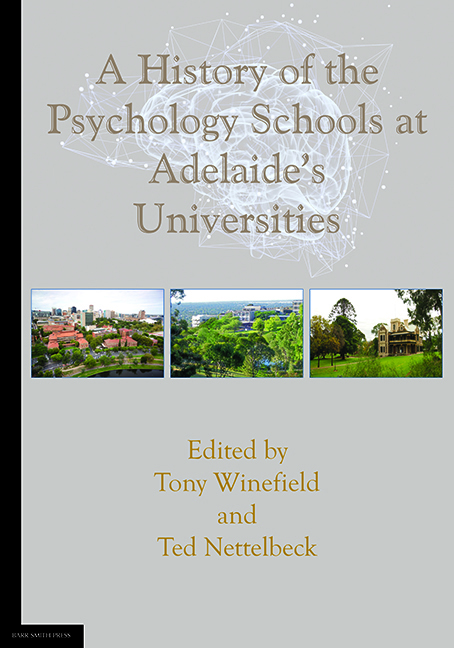Book contents
- Frontmatter
- Contents
- List of contributors
- Preface
- 1 Introduction
- 2 The origins and early history of the University of Adelaide's School of Psychology
- 3 The later years
- 4 Teaching applied psychology at the University of Adelaide: A personal view
- 5 Flinders University: Psychology in the twentieth century
- 6 Recent history of Flinders School of Psychology
- 7 The history of Psychology at the University of South Australia: From little things big things grow
- 8 The history of Psychology at the University of South Australia: Recent history
8 - The history of Psychology at the University of South Australia: Recent history
Published online by Cambridge University Press: 25 July 2017
- Frontmatter
- Contents
- List of contributors
- Preface
- 1 Introduction
- 2 The origins and early history of the University of Adelaide's School of Psychology
- 3 The later years
- 4 Teaching applied psychology at the University of Adelaide: A personal view
- 5 Flinders University: Psychology in the twentieth century
- 6 Recent history of Flinders School of Psychology
- 7 The history of Psychology at the University of South Australia: From little things big things grow
- 8 The history of Psychology at the University of South Australia: Recent history
Summary
Part 2: Recent history (2005-16)
To complement this chapter, academic staff working in the school in 2015 were invited to write about themselves, their highlights and their experiences. This additional material can be located at the School of Psychology's website.
Overview 2005-16
The decade since 2005 has seen large changes to the UniSA School of Psychology. This includes its leadership, research focus, degree offerings and personnel. Of all these changes, the most notable has been the merger of the School of Psychology with the School of Social Work and Social Policy. Another major influence on the life of the school over this time has been the change in vice-chancellors, with the consequent impact on school priorities and activities.
In common with contemporaries at other schools in the country, the school has seen the transition from traditional to digitally informed teaching practices (with more change in the wings); the reduction in postgraduate offerings (resulting in a singular focus on clinical psychology); the move to a demand-driven education system and less restrictive entry requirements (with psychology accounting for an especially high proportion of these new students); the introduction of Federal Government oversight of clinical registration and program accreditation (with a rise in the cost of accreditation and greater complexity in governance); the introduction of the Australian Quality Framework and the subsequent regulation of degree structures and curriculum standards; an increased focus on research performance (with a greater reliance on external benchmarking, such as the Excellence in Research Australia [ERA] scheme); the expectation of greater individual accountability, leading to the increased formalisation of academic work practices; pressure to increase international student numbers, partly to globalise the student body but also to generate revenue; and, finally, an increased pressure on productivity against a background of shrinking resources. Much of the school's activities over the last decade have been in response to these broader influences.
Over and above the broader external influences, local factors have also influenced the school. The regional teaching units at Whyalla and Mount Gambier have been incorporated into the school, resulting in a greater emphasis on regional engagement. There has been the slow but welcome consolidation of psychology staff from around the university onto one campus at Magill.
- Type
- Chapter
- Information
- A History of the Psychology Schools at Adelaide's Universities , pp. 195 - 206Publisher: The University of Adelaide PressPrint publication year: 2016



